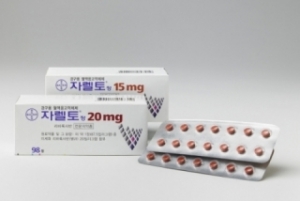A new study shows Xarelto (ingredient: rivaroxaban) to result in fewer strokes and systemic emboli compared to warfarin in frail patients with non-valvular atrial fibrillation (NVAF), Bayer Korea said Thursday.

Xarelto, developed by Bayer, is an anticoagulant medication indicated to decrease the risk of stroke and systemic embolism in patients with NVAF, among four other indications.
The retrospective, real-world study aimed to find the effect of Xarelto on frail patients using U.S. Truven MarketScan claims data. Frailty is seen primarily in older adults and makes it difficult to recover from stressful cardiovascular events and become vulnerable to poorer health outcomes.
Findings from the study on 10,754 frail patients with NVAF over two years showed that long-term Xarelto uses reduced the risk of stroke and systemic embolism by 32 percent. It also decreased the use of ischemic stroke alone by 31 percent compared to warfarin and showed no notable increase in significant bleeding.
"These results show long-term rivaroxaban use reduced stroke and systemic embolism in a vulnerable patient group, without increasing the risk of major bleeding. They also give physicians important insights into a well-tolerated, effective approach to treat their frail patients with NVAF," said Professor Craig Coleman of Pharmacy Practice at the University of Connecticut.
“This study once again provides clinical evidence for Xarelto in frail patients who have a possibility of not being able to get relatively appropriate NOAC treatment,” said Dr. Martin van Eickles, director of Global Medical Affairs at Bayer.
Results of the study were published in the Journal of the American Heart Association.

